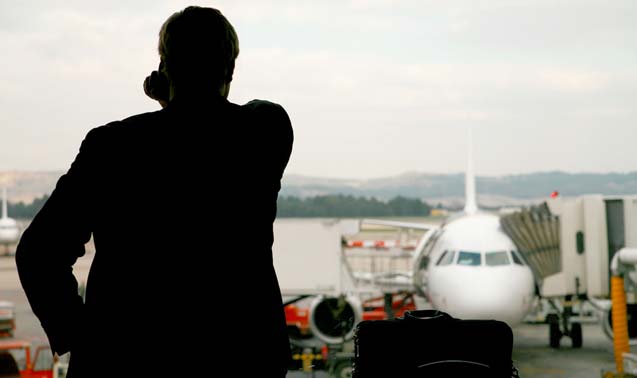
It’s January 2017, 5:30 AM, and I’m boarding a Boeing 787 Dreamliner, nonstop Seattle to New York with continuing service to Frankfurt. Ahead of me, a not-so-smart person is bellowing into his smartphone. “OK, yeah, now I’m putting my bag into the overhead compartment. … I can’t hear you, speak up!”
Turns out he has the seat right next to me. I’ve chosen a window to dream a bit, and then get a few glimpses of the scenery while I do some personal brainstorming for a new book I’m writing.
I say hello to my seatmate, but he has more important things to do than acknowledge the human being next to him and continues to shout into his phone until a flight attendant enforces the rule, well after we were asked to turn phones off.
When we reach 10,000 feet, a voice announces that use of digital and cellular devices is now permitted. My seatmate hurries to make another call while I try to sleep. It’s no use. Soon he is hollering at whoever is on the other end of the line that he’s mad about having to fly economy – “Don’t they know who I am?!”
The mother behind me quiets her screaming baby with a bottle. Her phone rings loudly. “Oh, hi, Mom, yeah. … Can you hear me, Mom? Speak louder, Mom! It’s hard to hear with the engines and all that.” Soon, the entire plane is a cacophony of competing voices. The conversations range from the banal to the boastful – “Did you remember to feed the hamster?” “I can get you 10 percent on that one, guaranteed.” The guy next to me is busy making deals at the decibel level of takeoff. He gets even louder after two beers. It’s hell on wings.
I’d hoped to have time to think, chew on ideas and make notes for my book. But I can neither sleep nor think. Maybe I’ll just look out the window. Bad idea. The announcer tells us all to close our shades so the light isn’t too bright for the video monitors. Ah, technology!
For me, planes have been a sort of sanctuary in the air, places to be alone with my thoughts, or engage in conversation with real, live seatmates. I’ve made some lifelong friends on flights, like Rafaela, who sat beside me from London to Chicago and years later showed me all around her home city of Rome.
Now the conversations are fewer as everyone seems plugged into iPods or other devices.
That’s their business. At least now I can think. But for how long? What will it be like with everyone jabbering on cells?
Allowing cellphone conversations on planes also would mean more employer demands to be in constant contact with the office. Former FCC Chairman Julius Genachowski says that will “enable both large and small businesses to be more productive and efficient.” But as the Harvard Business School’s Leslie Perlow, author of Sleeping With Your Smart Phone, points out, that’s not so. Her studies show workers are more productive when not on an electronic leash while traveling.
Cardiologist Sarah Speck, who runs the heart program at Seattle’s Swedish Hospital, tells me that “we need our downtime.” She says the stress of workplace demands, exacerbated by constant connectivity, is “the new tobacco” in American society, leading to earlier onset of heart disease, which she is now seeing in patients in their 40s.
Some people suggest talking sections on the plane as a compromise. But I’ve sat at the front of buses and heard every word of someone’s conversation in the back. Then, of course, there are earphones, but you do want to hear the airline messages just in case. …
Midway through our flight, I smell smoke and see the flight attendant frantically trying to get our attention. Nobody’s listening. She’s saying something about lithium batteries, or was it faulty rivets? I’m not sure what given the noise level. Just when I thought Boeing had fixed the problem. Safety anyone?
While writing this piece, I did a quick, unscientific poll of my Facebook friends. Mostly, they were aghast, although one suggested allowing short calls for emergencies. Then there was Bruce Elkin’s idea. If planes allow cellphone conversations, he suggested, lots of people will be upset enough to stop flying. We might start building high speed rail instead, and that would be good for the environment.
Pretty clever, but I still think rejecting the use of cellphones on planes is a no-brainer. We all need to let the FCC know what we think and keep at least a little quiet time for ourselves.
Trump is silencing political dissent. We appeal for your support.
Progressive nonprofits are the latest target caught in Trump’s crosshairs. With the aim of eliminating political opposition, Trump and his sycophants are working to curb government funding, constrain private foundations, and even cut tax-exempt status from organizations he dislikes.
We’re concerned, because Truthout is not immune to such bad-faith attacks.
We can only resist Trump’s attacks by cultivating a strong base of support. The right-wing mediasphere is funded comfortably by billionaire owners and venture capitalist philanthropists. At Truthout, we have you.
Truthout has launched a fundraiser to raise $45,000 in the next 8 days. Please take a meaningful action in the fight against authoritarianism: make a one-time or monthly donation to Truthout. If you have the means, please dig deep.